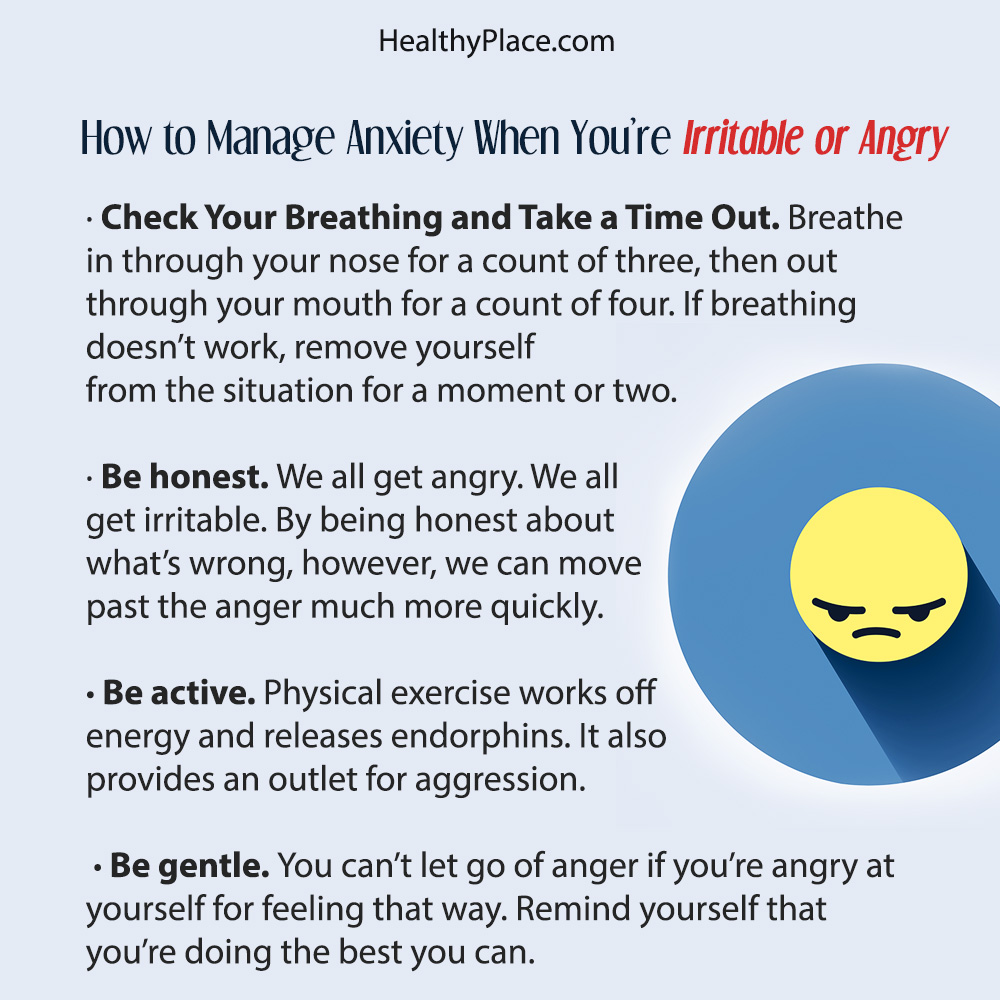Irritable, Angry and Anxious: Anger Management and Anxiety
 Irritability and anger can be related to anxiety. When we think of anxiety, most of us think of worry and fear. Occasionally, we may think of compulsions and obsessions, but few of us think of irritability and anger. These last two anxiety symptoms, however, are often just as distressing as the others. In fact, for some people, irritability and anger may be the most troubling symptoms of generalized anxiety disorder (GAD).
Irritability and anger can be related to anxiety. When we think of anxiety, most of us think of worry and fear. Occasionally, we may think of compulsions and obsessions, but few of us think of irritability and anger. These last two anxiety symptoms, however, are often just as distressing as the others. In fact, for some people, irritability and anger may be the most troubling symptoms of generalized anxiety disorder (GAD).
The Relationship of Irritability and Anger to Anxiety
Anger, particularly internalized anger (or anger we feel but don’t show), has been shown to intensify generalized anxiety and to make treatment more difficult.1 Researchers postulate that this may be because both anxiety and anger are impacted by negative thought processes, especially those centering on uncertainty.2
When a situation is ambiguous, such that the outcome could be good or bad, anxious individuals tend to assume the worst. That often results in heightened anxiety. There is also evidence of that same thought process in individuals who are easily angered. Therefore, anger and GAD may be two manifestations of the same biased thought process. ~ Sonya Deschenes3
Managing Anger and Irritability Help Decrease Anxiety
To manage rage, anger and irritability effectively, we must first be able to recognize the feelings. Once we learn how to do that, dispelling irritability and anger--and anxiety--becomes much simpler.
Physical signs of anger include:
- Clenched jaws or fists
- Tense shoulders or back
- Sudden sweating
- Rapid heartbeat
- Flushed face or a feeling of heat in the hands, neck, or head
- Dizziness
- Trembling
- Headache
- Stomachache
How to Manage Anxiety When You're Irritable or Angry
If you find yourself suddenly experiencing any of these physical symptoms of anxiety, make a mental note. Recognize that you’re getting irritable and anxious and then work to calm down.
Check Your Breathing and Take a Time Out
Before yelling or snapping, take a deep breath. Breathe in through your nose for a count of three, then out through your mouth for a count of four. Repeat as many times as needed until you feel your muscles relax or your other physical symptoms subside.
If breathing doesn’t work, remove yourself from the situation for a moment or two. There’s no shame in taking a timeout. We know it works – that’s why we make our children do it. Take a minute or five to relax your body and calm your thoughts. Often, with just a simple break, we can recover balance.
Other Tips to Manage Anxiety with Anger and Irritability
Be honest. It doesn’t matter what set you off. No one is going to judge you – except you. It’s all right if it was silly or petty. It’s all right if it was something you swore you wouldn’t let anger you anymore.
We all get angry. We all get irritable. We all let the little things bother us every once in awhile. By being honest about what’s wrong, however, we can move past the anger much more quickly, often even laughing at ourselves in the process and reducing overall anxiety levels.
Be active. Physical exercise works off energy and releases endorphins (feel-good chemicals in the brain.) It also provides an outlet for aggression. Take a walk, go for a run, stretch, or practice yoga. You’ll likely feel much more relaxed when you’re finished.
Be gentle. We all tend to be harder on ourselves than we ever would be on a loved one. Irritability and angry outbursts are a part of most anxiety disorders, especially GAD. That may be why so many of the physical symptoms are the same. It’s possible our bodies experience the two emotions similarly.
So be gentle with yourself. You can’t let go of anger if you’re angry at yourself for feeling that way. Remind yourself that you’re doing the best you can and that you’re working every day to find new and better ways to manage your illness.

Sources
- Deschênes, S. S. (2014, July 01). The Role of Anger in Symptoms and Processes of Generalized Anxiety Disorder. Retrieved August 17, 2017.
- Fracalanza, K., Koerner, N., Deschênes, S. S., & Dugas, M. J. (2014, February 28). Intolerance of Uncertainty Mediates the Relation Between Generalized Anxiety Disorder Symptoms and Anger. Retrieved August 17, 2017.
- Desjardins, C. (2012, December 4). Understanding anger, overcoming anxiety. Retrieved August 17, 2017.
APA Reference
Hackley, S.
(2017, August 17). Irritable, Angry and Anxious: Anger Management and Anxiety, HealthyPlace. Retrieved
on 2026, March 5 from https://www.healthyplace.com/blogs/treatinganxiety/2017/08/the-irritable-anxious-managing-anger
Author: Sarah Hackley
I liked the post-anger and anxiety are connected also as responses to threats. If you get angry quickly, it may help to know that you actually have time to stop yourself from getting angry--but it is only 1/4 of a second! We wrote a blog post on this on our website, I can send a link, if that is appropriate let me know.
Thank you for your post, Peggy. You're welcome to share a link and our team will decide whether it is appropriate to post. All the best.